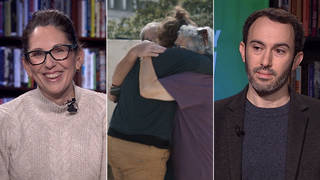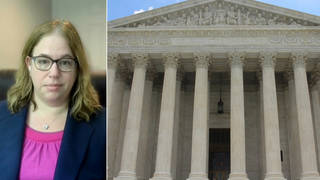
Guests
- Annette Gordon-Reedprofessor of history at Harvard University, president of the Organization of American Historians and an award-winning author.
The White House has called for a far-reaching review of Smithsonian museum exhibitions in order to ensure they align with President Trump’s interpretation of U.S. history. “The idea that the Smithsonian — which was created as an independent entity — should reflect any administration’s vision of history, and not the vision of the historians and the researchers and the other people who devote their lives to studying these things, is more than problematic,” says Annette Gordon-Reed, professor of history at Harvard University, president of the Organization of American Historians and an award-winning author.
The Trump administration and the Department of Education are also currently partnering with PragerU, a controversial conservative media company, to make educational materials. “This is a whitewashing of history under the guise of making white children feel better about themselves,” says Gordon-Reed. PragerU content has already been approved for use in public schools in 10 states across the country.
Transcript
AMY GOODMAN: This is Democracy Now!, democracynow.org. I’m Amy Goodman.
We end today’s show looking at plans by the White House for a far-reaching review of Smithsonian museum exhibitions in order to ensure they align with President Trump’s interpretation of U.S. history. That’s according to The Wall Street Journal, which obtained a letter from a White House official instructing that Smithsonian exhibits could be, quote, “accurate, patriotic, and enlightening — ensuring they remain places of learning, wonder, and national pride for generations to come,” unquote. In March, the president signed an executive order directing officials to eliminate, quote, “improper, divisive, or anti-American,” unquote, ideology from its museums.
This latest plan comes after the Smithsonian removed references to two Trump’s — to his two impeachments during his first term in office. Pressed for details, this is President Trump speaking last week during the signing of an executive order.
PRESIDENT DONALD TRUMP: We want the museums to talk about the history of our country in a fair manner, not in a woke manner or in a racist manner, which is what many of them — not all of them, but many of them — are doing. Our museums have an obligation to represent what happened in our country over the years, good and bad, but what happened over the years, in an accurate way.
AMY GOODMAN: The Smithsonian has said they have returned the references to Trump’s impeachment.
For more, we’re joined by Annette Gordon-Reed, a Harvard history professor and president of the Organization of American Historians. She is the Pulitzer Prize-winning author of the book The Hemingses of Monticello: An American Family, and her most recent book is titled On Juneteenth.
Professor, welcome to Democracy Now! It’s an honor to have you with us. Let’s begin with the Smithsonian and, of course, also so significantly, what’s happening to the Smithsonian Museum of African American History and Culture.
ANNETTE GORDON-REED: Well, it’s something of a — not a shock, because we see other things that are happening at the same time. But the idea that the Smithsonian — which was created as an independent entity — should reflect any administration’s vision of history, and not the vision of the historians and the researchers and the other people who devote their lives to studying these things, is more than problematic, I would say. So, it’s not a shock, because we can see what’s happening in other arenas, but it is something that’s a departure from what should be expected, what is right, actually.
AMY GOODMAN: Talk about the founding of this museum, what it took, and how interesting — I mean, years ago, I did an interview with Lonnie Bunch, who was the founding head of the African American Museum of the Smithsonian, who then was elevated to be head, as he is today, of all the Smithsonian museums — and what this means to President Trump.
ANNETTE GORDON-REED: Well, I think there’s an attempt to shape the narrative of history. As we know, history is political in many ways. And this is an opportunity, he feels, the administration feels, to put his stamp on the way we tell the story of America. And I don’t think that this is something that the American people want. We see survey after survey that indicates that people support the idea of a capacious and a truthful, unvarnished picture of American history, because that’s the only way to figure out what happened in the past. There’s no way to learn if you don’t know what actually happened.
AMY GOODMAN: I want to go to an issue of curriculum in this country that also will affect the Smithsonian museums. Starting this school year in Oklahoma, teachers must earn a teaching certificate to be able to teach in the public schools of Oklahoma this school year, in what an Oklahoma school official says will “[keep] away woke indoctrinators.” The assessment was designed by PragerU, a conservative media company, the talk show host Dennis Prager’s company, whose educational materials have been approved for use in public schools already in 10 states, including Arizona, Florida, Texas, New Hampshire and Louisiana. One of their recent videos, which kids are shown, which has gone viral, features a cartoon of Christopher Columbus downplaying and justifying the practice of slavery.
CHRISTOPHER COLUMBUS: Slavery is as old as time and has taken place in every corner of the world, even amongst the people I just left. Being taken as a slave is better than being killed, no?
AMY GOODMAN: “Being taken as a slave [is better] than being killed, no?” As if also they’re mutually exclusive. Annette Gordon-Reed, can you talk about what is being taught here that kids are being subjected to, and the larger thread, and if you feel it’s a white supremacist take on history?
ANNETTE GORDON-REED: Well, it’s an attempt to play down or downplay what happened in the United States with slavery. Of course, slavery has existed, since biblical times. People know that. That’s not something that has never been acknowledged. But the question is: How did it play out in North America, from American history? How did we do it? What effect did it have on the people who were enslaved, and what legacies are still there?
This is a way of trying to prove that nothing bad happened to African American people, that there’s no reason for any kind of redress, that there’s no reason to pay any attention to the legacies of slavery. So, this is something that they’ve long wanted to achieve. And because they are in political ascendency at this moment, that they can do it. But this is a — this is a whitewashing of history —
AMY GOODMAN: Annette Gordon —
ANNETTE GORDON-REED: — under the guise of making white children feel better about themselves. I mean, the thinking is that they feel guilty. And that has not been my experience in talking to young people about slavery, the institution of slavery. They know that they are not responsible, that they didn’t enslave people, there’s no reason for them personally. But it’s reason for them to understand why things are the way they are, and how we go about creating a fair and multiracial society.
AMY GOODMAN: I wanted to go back to your Pulitzer Prize-winning book, Professor Gordon-Reed, to The Hemingses of Monticello: An American Family. And if you would talk about how Sally Hemings and the family has been talked about in the past? I remember going on a tour where she was not discussed as an enslaved person, and having to ask a question of the tour guide there: Why aren’t you telling us more? Talk about the story as you feel it needs to be told. And do you believe that narrative is threatened today in places like Oklahoma, right up to the whole Smithsonian array of museums?
ANNETTE GORDON-REED: Well, there’s been a sea change in the attitude at Monticello about how you talk about Sally Hemings. There’s actually a tour that’s devoted to the Hemings family, and her story is told there in a particular room that we thought she may have lived in for a time at Monticello. It’s important, because it shows you that this country has never been just a white country. It’s a country that involved slavery, which was just making people work without pay. It was a society where blood mingled. There are — people enslaved their own family members. And that’s something that I think people should know. And my experience when talking to people about this is that Americans want to know history, want to know the accurate history.
That story may be imperiled. I mean, there are always people who fight against it, because they think it reflects poorly on Jefferson, that it makes him something other than a white person, in a way, to have had children with a woman who was African American and part-African American. But we always fight these battles, and it’s just — it’s a continuing struggle, and that’s the nature of it. We have to defend what is true and follow history, to follow the truth to wherever it leads us.
AMY GOODMAN: Professor Gordon-Reed, I also wanted to ask you about these latest developments: Defense Secretary Pete Hegseth recently announcing that a Confederate memorial removed from Arlington National Cemetery would be put back — the 32-foot bronze statue was actually installed almost 50 [years after] the Civil War ended, in 1914 — as well as reinstalling a statue of Confederate general and alleged Ku Klux Klan member Albert Pike in D.C., that was torn down by Black Lives Matter protesters back in 2020. Can you talk about the significance of this?
ANNETTE GORDON-REED: Well, the significance of it is that it’s somewhat akin to why they were put up to begin with: as a statement about white supremacy, I think, in promoting this notion. There’s no reason to honor people who attacked the United States of America, fought against the United States of America. This was a way of sending a signal to African American people in the community, in the places where these things were put up, all across the South, that we were not really a part of America. And I think it still has the same message today.
AMY GOODMAN: And I also wanted to ask you, as a professor — I was just reading an article about Howard students returning to campus, especially the first-timers, you know, actually, the freshmen, who are coming to Washington, D.C., and being afraid to step foot outside their new dorms because of the occupation of the city by National Guard troops, and what could happen to them if they take one false step, or even if they don’t do anything that they know is a problem. Can you talk about the significance of what’s taking place?
ANNETTE GORDON-REED: Well, it’s sad, because this should be a time of excitement, looking forward to a future, and the notion that you feel threatened by being in the place where you’re — that’s supposed to be your new home for four years, you’re beginning your journey in life, is a terrible — is a terrible thing. But I think, in general, this is a part and parcel of all of this, is — together, is a movement to, I think, marginalize African American people even more. I mean, Washington is a city with a large Black population. The optics of it suggests that this is a desire to sort of take control and to send the message that we aren’t really a part of this society. And that’s the great tragedy of it.
AMY GOODMAN: Finally, Professor Gordon-Reed, I wanted to ask you about your new book, On Juneteenth. It’s part-history, but also part-memoir and meditation on your own growing up in Texas, the original home to Juneteenth. Tell us, in the midst of this climate, what it means to you.
ANNETTE GORDON-REED: Well, it means — it’s sort of interesting, because when it became a federal holiday, it looked like this was a chance for people, on a yearly basis, to talk about — an occasion to talk about slavery and the legacies of slavery. And now that could be in jeopardy, as well. I mean, we’ve been celebrating this holiday as a state holiday in Texas since 1980. This red state, or this purple, you know, gerrymandered state, has been celebrating Juneteenth since 1980. And the idea that we may pull back from that, or we have pulled back from that, is a little disheartening.
But I think we will — you know, we will continue. I mean, people celebrated in 1875, in the end of Reconstruction, every year since, since the day itself. So, I continue that we will persevere. I’m assuming that we will, in fact, persevere and go ahead with it. But it’s definitely under attack now in this whole measure, this whole effort to take things back, roll back the civil rights movement and roll back advancements for African American people.
AMY GOODMAN: Annette Gordon-Reed, I want to thank you so much for being with us, Harvard history professor —
ANNETTE GORDON-REED: Thank you for having me.
AMY GOODMAN: Thank you — and president of the Organization of American Historians. She’s the Pulitzer Prize-winning author of the book The Hemingses of Monticello: An American Family, and her most recent book is titled On Juneteenth.
That does it for our broadcast. Democracy Now! is produced with Mike Burke, Renée Feltz, Deena Guzder, Messiah Rhodes, Nermeen Shaikh, María Taracena, Nicole Salazar, Sara Nasser, Charina Nadura, Sam Alcoff, Tey-Marie Astudillo, John Hamilton, Robby Karran, Hany Massoud and Safwat Nazzal. Our executive director is Julie Crosby. Special thanks to Becca Staley, Jon Randolph, Paul Powell, Mike Di Filippo, Miguel Nogueira, Hugh Gran, Carl Marxer, Denis Moynihan, David Prude. I’m Amy Goodman. Thanks so much for joining us.













Media Options